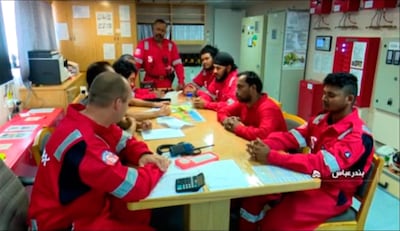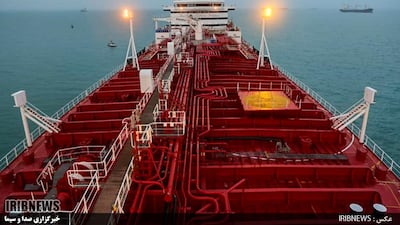Sweden is speaking to the United Kingdom and Iran over a British-flagged tanker seized by Islamic Revolutionary Guards Corps naval forces.
It comes as Iran hinted at the possibility of a ship swap.
A Swedish company owns the Stena Impero, although it sails under a British flag.
"Sweden is concerned by developments in the Strait of Hormuz," the Swedish Foreign Ministry said.
"For Sweden and the EU, it is vital that freedom of navigation is protected. Given the very serious situation in the region, it is also important that the measures taken help to ease tensions.
"Sweden is conducting a dialogue at various levels with the UK, Iran and other relevant stakeholders ... and we hope to find a resolution to the issues and de-escalate the tense situation."
Stena Bulk, the owner of the vessel, said on Wednesday that it had spoken to all 23 crew of the ship and they are all well.
"We had direct contact with the crew on board the vessel last night by telephone and they're all OK and in good health and they're getting good co-operation with the Iranians on board," Stena Bulk spokesman Pat Adamson said.
The vessel's captain had said there was sufficient food on board and that crew members have communicated with their families, he added.

Stena Bulk chief executive Erik Hanell said he hoped Tuesday's contact was "a first sign that we will soon see more positive progress from the Iranian authorities".
On Wednesday, Iranian President Hassan Rouhani hinted at the possibility of ship swap.
He told his cabinet: “If Britain steps away from the wrong actions in Gibraltar it will receive an appropriate answer from Iran."
It came as Iranian officials claimed that Britain had sent a mediator to discuss the issue.
But sources in the British government told Reuters news agency that no mediators have been sent from London to negotiate with Iran directly after the semi-official Tasnim news site reported the arrival of such a team.
"We are not aware of any representatives being sent as mediators to Iran," a British diplomatic source said.
European states are discussing assembling a maritime force to protect shipping in the Arabian Gulf and prevent any further ships being taken. However, such a force – if it is assembled – would be complementary to a proposal put forward by the US for a coalition of willing states to undertake a similar measure, a US general said on Wednesday.
Washington first proposed a multinational effort in June that would be open to all allies and partners aimed at bolstering maritime security in the Gulf. As well as taking the Stena Impero, Washington accuses Iran of attacking oil tankers around the Strait of Hormuz, a critical maritime choke point between Iran and Oman.
Asked about the British proposal, US Marine General Joseph Dunford, chairman of the Joint Chiefs of Staff, said his discussions "right now wouldn't indicate that that's a stand-alone effort that's separate from ours".
"I view that as a European contribution to maritime security that would be complementary, if not integrated, with what the United States is doing," Gen Dunford. He did not say whether he had discussed the matter directly with Britain.
However, America’s European allies have distanced themselves from the White House’s policy of maximum pressure since President Donald Trump withdrew from the 2015 nuclear deal last year.
Europe still backs the deal and has looked at ways to safeguard the agreement.
Also on Wednesday, President Rouhani said that Tehran was not looking for tensions with any European countries, in a possible indication that he is looking to cut a deal to end the tanker issue.
Mr Rouhani also said he was ready for "just" negotiations to resolve the regional tensions but would not surrender.
The Iranian president seemed to be referring to the idea of talks with the United States on tensions since Mr Trump withdrew from the 2015 nuclear deal. The president has said he is willing to hold talks with the Islamic republic.
"As long as I have the responsibility for the executive duties of the country, we are completely ready for just, legal and honest negotiations to solve the problems," Mr Rouhani said, according to his official website.
"But at the same time, we are not ready to sit at the table of surrender under the name of negotiations."
He said that if the US violates Iranian airspace again with another drone then it will be met with the same response as a drone that was shot down by the Islamic Revolutionary Guards Corps last month.
America said that one of its warships took defensive action against a second Iranian drone in the Strait of Hormuz last week, but did not see the drone go into the water. Tehran has denied losing any unmanned aircraft.
"This was a defensive action by the USS Boxer in response to aggressive interactions by two Iranian UAS platforms in international waters," Lt Col Earl Brown, a US Central Command spokesman, said. UAS is an acronym for unmanned aerial system.
London has called on all British-flagged ships to avoid the straits for the time being given current tensions.
However, Maritime publication Lloyd's List identified the UK-flagged vessel BW Elm as having traversed the Arabian Gulf and docked at a port in Qatar on Wednesday.
This makes it the first such passage made by a British ship of its size since Iran seized the Stena Impero, according to maritime tracking data.
The Lloyd's list also reported that a British warship, likely the HMS Montrose, closely shadowed the large liquefied petroleum gas carrier but that the Royal Navy did not provide a direct escort.
The Ministry of Defence declined to specifically comment on the transit and referred to recent comments made by Foreign Secretary Jeremy Hunt, in which he confirmed the HMS Montrose has accompanied more than 30 ships over the last ten days through the strait.
One-fifth of global crude passes through the shipping corridor, making it an internationally important chokepoint for global energy supplies from Gulf exporters.

